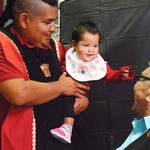In September, 2017, St. James’ Anglican Church in the Downtown Eastside of Vancouver held a Reconciliation Feast to bring together parishioners and survivors of Canada’s Residential Schools who live in Vancouver. In the spirit of Reconciliation, the Feast honoured the strength, resilience, courage and dignity of survivors, and celebrated the beginning of a renewed relationship between our church and our Aboriginal neighbours.
Prior to the Feast, parishioners were given an opportunity to learn from an Aboriginal facilitator about the impacts of colonialism, and about First Nations protocols. This helped them to be informed and prepared to move beyond apologies and instead walk alongside our Aboriginal guests. The Feast moved us into a new relationship of healing, and it was an important step in learning about and caring for each other.
Parishioners and survivors sat together to enjoy a meal of traditional food, and First Nations performers shared their songs and dances. In the Aboriginal way of ‘witnessing’, guests were chosen to speak at the end of the gathering about what they experienced, and they committed themselves to sharing what they had seen and heard. Sharing this video attached below (produced by Toronto’s Anglican Video) and these instructions (printed below and also available as a downloadable PDF) on holding a Feast is another way of letting churches know what one example of Reconciliation can look like, and how two worlds can celebrate and heal together.
The following instructions were written by the Reverend Dr. Victoria Marie pastor of Our Lady of Guadalupe Tonantzin Community:
THE RECONCILIATION FEAST
PLANNING AND HOSTING A SIMILAR EVENT IN YOUR COMMUNITY
Each community is unique, so be creative. Listen for ideas from Indigenous parishioners. In so doing, you may hear an idea that could blossom into an event that brings non-indigenous and Indigenous people together as equals.
Any group activity should be conducted in an atmosphere of compassion, respect and safety. Non-indigenous participants in any intercultural activity may need to learn the practice of active listening, that is, hearing what is being said and suppressing the urge to judge, fix, or correct.
It is important to build relationships and provide non-Indigenous parishioners with opportunities for education on the histories and experiences of Indigenous peoples. After gaining an awareness of Indigenous history, familiarity with the Truth and Reconciliation Commission of Canada: Calls to Action and The United Nations Declaration on the Rights of Indigenous Peoples should be encouraged.
The following suggestions may be helpful in organizing an event in your community:
- Listen. If an idea seems too grand, don't dismiss it out of hand. Elder Kelvin Bee's original idea, to have the Feast at BC Place Stadium, was not feasible. However, having the Feast in the St. James' parish hall was achievable.
- Discuss the idea with local Indigenous organizations and seek their cooperation and support.
- Discuss the idea with your parishioners and seek their cooperation and support.
- Secure funding.
- Form a planning team with Indigenous and non-Indigenous members.
- Develop a planning tool that reflects the tasks needed for your project and the lead person for each task. Sample tasks: publicity, program content, volunteers, food, venue, decorations, turnout, contacts.
- Recruit the organizations and volunteers needed to achieve your goal. Ecumenical involvement of local churches as well as inviting the participation of secular community organizations enhance your chances of success in reaching residential school survivors in your area and widening your pool of volunteers.
- Hold intercultural communication sessions for the team and volunteers facilitated by someone skilled in this area, preferably a First Nations person versed in the protocols of the local First Nations. Just as Europe is made up of many nations with various languages and cultures, so too is North America. For example, more than thirty languages are spoken by the Indigenous Peoples of British Columbia.
- Ensure that your project should be culturally appropriate to your area, which includes but is not limited to Indigenous symbols, decorations and food.
- Provide a vehicle for all participants and volunteers to give feedback.










